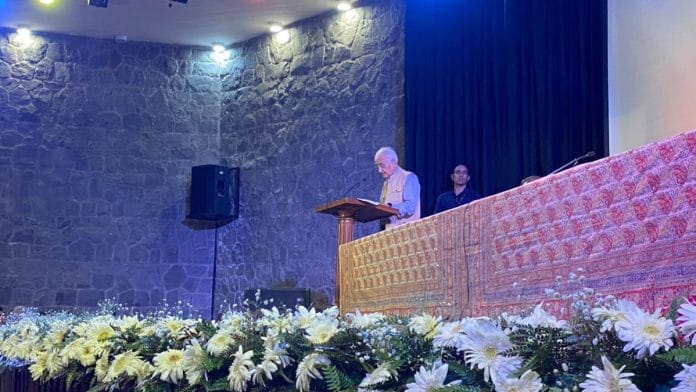New Delhi: “Decade after decade, if you want to know the arguments that got under the government’s skin, you have to read A.G. Noorani,” said Siddharth Varadarajan, the founding editor of The Wire.
Varadarajan was speaking Friday at the memorial meeting held for the late senior lawyer, scholar, and writer Abdul Ghafoor Noorani at the India International Centre (IIC) in New Delhi. Noorani died in Mumbai in August this year.
The event at IIC was moderated by senior journalist Qurban Ali and chaired by former Vice-President of India M. Hamid Ansari. Speaking on the panel were former Union Ministers Mani Shankar Aiyar and Salman Khurshid, alongside former editors-in-chief of The Tribune and The Hindu, Harish Khare and N. Ram, respectively.
“An observer and a critic for six to seven decades, he had an ability to speak honestly and dispassionately about public affairs. Although critical of Israel’s occupation of the Palestinian people, he would equally appreciate a good judgment of the Israeli Supreme Court on an important point of law,” Varadarajan said.
Saying that perhaps his biggest regret would be not being able to poach Noorani from Frontline, a magazine to which he remained loyal, Varadarajan added that one of the last pieces he wrote for The Wire was how Modi can learn from Israel when it comes to how democracies debate the actions of their armies.
Noorani was meticulous in gathering documents, establishing a timeline, and overall a methodical chronicler. However, he was also a person with a great attachment to a sense of justice. Whether it was writing on Kashmir or the Babri Masjid controversy, the importance of human rights and secularism were central to his scholarship.
Subsequently, human rights lawyer and senior advocate Colin Gonsalves read from Noorani’s book on Article 370, which said, “Article 370 (1)(d) is not and cannot just be a one-way stream. It has been brought into existence so as to invest the Constitution with requisite resilience in order to respond to ground situations warranting solutions, so that the relationship between the states and the Union is placed on an even keel.”
Referring to preventive detention cases in Kashmir, Gonsalves recalled Noorani’s writings on the subject and said, “After so many such preventive detention cases in Kashmir, which usually last the whole term of two years, without the court delivering a judgment, you have a slight turn around with the top court’s directive that if you don’t’ deal with the representation of the detenu, he must be released immediately.”
Adding that the topic of extrajudicial executions, which Noorani wrote on then, is still relevant today, Gonsalves recalled the execution of 150 innocent tribals in Chhattisgarh and said, “No court is willing to look at it. The judiciary today is not willing to listen to it. We went to Chhattisgarh and recorded the testimony of 80 tribal women, whose children, husbands, and others were executed.”
On the death penalty, which Gonsalves said was abolished in most countries, he said, “India today is as far away from abolishing the death penalty as it was when Noorani sahab wrote. When you read about the demonstrations in Kolkata and the call for a death penalty for rapists and the bill drafted by the state of West Bengal, you realise that time has stood still.”
Gonsalves also recalled Noorani’s writings on undertrials, while adding that India’s prisons have about 200 percent overcrowding.
Talking about how the Supreme Court doesn’t have the time to deal with the challenge to anti-conversion law, which has been lying before the SC for several years, he said, “The court has time for commercial and insolvency matters but not to hear these anti-conversion law matters, where persons have been jailed over ‘allurement’ which, for Christians, means that if you offer a person a place in a Christian school or give them a chance to go to a Christian hospital, that would come within the definition of allurement.”
Following this, former editor-in-chief(s) of the Tribune, Harish Khare, also shared some anecdotes about Noorani, while adding that he would have made a great judge, “but he would not be one, because he would not play by the rules.”
Also read: Yechury, Noorani obits show Modi has redefined political ideology more than Indira
‘Inexhaustible in his research’
Former law and external affairs Union minister Salman Khurshid also spoke at the event, adding, “Noorani was undoubtedly erudite, courageous, and inexhaustible in his research. He (Noorani) would search through piles of dust and documents, even before the days of the internet.”
Besides this, Mani Shankar Aiyar, the former Union minister who held portfolios like petroleum and natural gas and youth affairs & sports, remembered his first meeting with the late AG Noorani. “I was introduced to him by his brother, and the first time we met, I felt like I was talking to an encyclopaedia. He had an amazing head for detail, an amazing memory for dates, and an astonishing ability to remember the nuances of what he was saying and what other people were saying. So naturally, one approached him with not just humility but also with a certain inferiority complex.”
Wrapping up the event, former President of India, Hamid Ansari, said, “It is perhaps not known to anyone that during a difficult time in India’s relations with the United States, Noorani Sahab’s advice was sought, and he gave it without going public about it.” Noorani, he added, was a “rare genius” of sorts.
Also read: ‘Call me Gafoor’. This is an unapologetically personal reminiscence of AG Noorani






